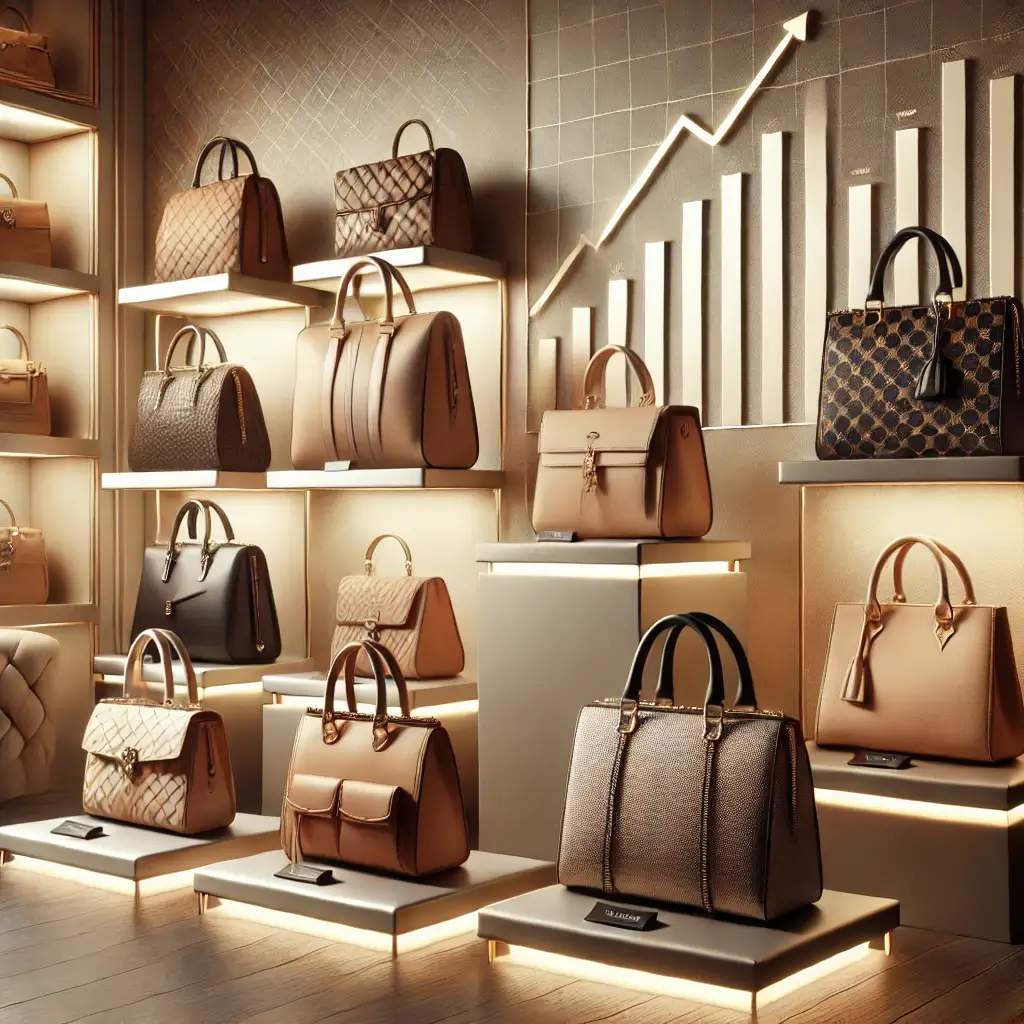The Luxury Handbag Market: A New Asset Class for Savvy Investors
The luxury handbag market has emerged as a formidable investment category in recent years, with Chanel and Louis Vuitton leading the sector. According to the Knight Frank Luxury Investment Index 2024, luxury handbags have demonstrated impressive resilience as an asset class, appreciating at an average rate of 13% annually over the past decade—outperforming many traditional investment vehicles.
Contrasting Strategies: Controlled Scarcity vs. Heritage Canvas
These prestigious houses represent two distinct approaches to value creation. Chanel employs a strategy of controlled scarcity and aggressive pricing, while Louis Vuitton maintains a broader market presence with its heritage canvas offerings. Understanding these fundamental differences is essential for investors looking to optimize their luxury accessories portfolio.
Chanel’s Classic Flap: The Gold Standard of Bag Investments
The iconic Classic Flap bag continues to demonstrate exceptional investment characteristics:
Medium Classic Flap (2024 Analysis)
– Current retail price: $10,200 (increased from $8,800 in 2023)
– Secondary market value: 110-125% of retail for new pieces
– Five-year appreciation rate: 85% cumulative
– Annual price increase: 8-12% average
Small Classic Flap Investment Profile
– Higher percentage appreciation than medium size
– Premium of 15-20% for rare colors
– Stronger performance in the vintage market
– Enhanced value retention for black caviar leather
Jumbo and Maxi Sizes
– More volatile price movements
– Stronger performance in Asian markets
– Premium pricing for limited editions
– Higher value maintenance in classic colors
The Boy Bag: Chanel’s Alternative Investment Pathway
The Boy Bag line demonstrates different investment dynamics:
– Lower entry price point than Classic Flap
– Stronger appeal to younger investors
– More significant seasonal color impact on value
– Average appreciation rate of 10% annually
Louis Vuitton Canvas: Liquidity and Consistency in Investment
Monogram Canvas Icons
– Consistent value appreciation of 5-7% annually
– Exceptional liquidity in the secondary market
– Lower maintenance requirements
– Enhanced value for vintage pieces
Limited Edition Canvas Pieces
– Premium pricing of 30-50% for rare combinations
– Strong performance of artist collaborations
– Higher appreciation rates for discontinued styles
– Significant regional price variations
The Capucines Collection: Louis Vuitton’s Premium Leather Contender
Capucines Collection
– Premium positioning similar to Chanel Classic Flap
– Strong appreciation potential in exotic leathers
– Enhanced value retention in classic colors
– Average appreciation rate of 8% annually
Chanel’s Price Strategy: Creating Investment Returns Through Scarcity
Price Appreciation Strategy
The house’s aggressive price increases have driven strong returns:
– Annual price increases exceed industry average by 3-4%
– Secondary market typically responds positively to retail increases
– Strong correlation between retail increases and resale values
– Enhanced perception of exclusivity
Materials and Craftsmanship: The Foundation of Chanel’s Value Retention
Quality and Materials
Investment in materials and craftsmanship supports value retention:
– Premium leather quality shows excellent aging characteristics
– Enhanced durability of hardware and construction
– Strong performance of vintage pieces
– Consistent quality across production years
Louis Vuitton’s Market Advantage: Accessibility and Global Resale Networks
Market Accessibility
Broader market presence offers different investment opportunities:
– Higher product availability reduces acquisition costs
– Strong global resale network
– Established authentication processes
– Robust secondary market liquidity
Louis Vuitton’s Historical Edge: Heritage Value as Investment Security
Heritage Value
The house’s history contributes to investment stability:
– Strong performance of vintage pieces
– Premium pricing for heritage designs
– Consistent brand positioning
– Proven long-term value retention
Conservative Chanel Strategy: Black Caviar and Gold Hardware for Long-Term Growth
Conservative Approach
– Focus on Classic Flap in medium size
– Black caviar leather with gold hardware
– Five to ten-year holding period
– Professional storage and maintenance
Aggressive Chanel Strategy: Limited Editions and Market Timing
Aggressive Approach
– Limited edition pieces
– Rare color combinations
– Vintage exceptional pieces
– Shorter holding periods with market timing
Conservative Louis Vuitton Strategy: Classic Monogram for Stable Returns
Conservative Approach
– Classic monogram canvas pieces
– Established leather styles
– Long-term hold strategy
– Regular authentication updates
Aggressive Louis Vuitton Strategy: Collaborations and Discontinued Lines
Aggressive Approach
– Limited edition collaborations
– Exotic leather pieces
– Discontinued styles
– Market timing based on collaborations
Global Market Trends: Asian Influence and Digital Authentication
Global Market Evolution
– Growing Asian market influence
– Increasing younger collector participation
– Enhanced digital authentication methods
– Strengthening secondary market infrastructure
Production Evolution: Quality Control and Authentication Technology
Production and Distribution
– Controlled production increases
– Enhanced quality control measures
– Improved authentication technology
– Strengthened authorized reseller networks
Balancing Your Luxury Portfolio: Complementary Investment Strategies
While both Chanel and Louis Vuitton offer compelling investment opportunities, their optimal roles in a luxury accessories portfolio differ substantially. Chanel pieces typically offer higher potential returns with corresponding higher entry costs and market volatility. Louis Vuitton provides more stable returns with greater market liquidity and lower maintenance requirements.
The Ideal Luxury Bag Investment Portfolio: Best of Both Worlds
A balanced portfolio might include flagship pieces from both houses, leveraging their complementary characteristics to optimize overall returns while managing risk.
Authoritative Market Research Sources
References
– Knight Frank Luxury Investment Index 2024
– Morgan Stanley Luxury Goods Analysis 2024
– The RealReal Luxury Resale Report 2024
– Christie’s Luxury Accessories Market Review 2024
– Deloitte Luxury Goods Investment Analysis 2024
– Luxury Institute Market Report 2024
– Sotheby’s Fashion & Accessories Market Data 2024
– Business of Fashion Investment Grade Accessories Report 2024
– Vestaire Collective Market Intelligence 2024
– WWD Luxury Market Analysis 2024

